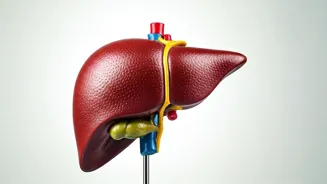Hydrate, Hydrate, Hydrate
Drinking enough water is a cornerstone of liver health, as it aids in detoxification. The liver processes toxins, and adequate water intake helps flush
them out efficiently. Aim to drink plenty of water throughout the day to keep your liver functioning optimally. Proper hydration ensures the liver can effectively carry out its detoxification processes, supporting overall health and well-being. Start your day with a glass of water and continue sipping throughout the day.
Embrace a Balanced Diet
Focusing on a healthy diet is vital for liver health. Your diet should prioritize whole foods, including fruits, vegetables, and lean proteins. Limit processed foods, sugary drinks, and excessive fats. Eating a balanced diet ensures your liver receives the necessary nutrients to function well. Incorporate foods rich in antioxidants, such as berries and leafy greens, to protect your liver from damage. Reduce your intake of unhealthy fats and refined carbohydrates for better liver function.
Regular Physical Activity
Engaging in regular physical activity benefits the liver. Exercise helps reduce fat buildup in the liver and can improve liver function. Aim for at least 30 minutes of moderate-intensity exercise most days of the week. This could be brisk walking, jogging, cycling, or any activity that raises your heart rate. Exercise not only supports liver health but also aids in weight management, further contributing to overall well-being.
Limit Alcohol Consumption
Alcohol consumption can significantly damage the liver. The liver is responsible for processing alcohol, and excessive intake can lead to inflammation and scarring. Limiting or avoiding alcohol can give your liver a chance to heal. If you choose to drink alcohol, do so in moderation. It's important to be mindful of your alcohol intake to protect your liver from harm and maintain its health. Reduce the burden on your liver by controlling your alcohol consumption.
Manage Medication Intake
Be cautious about the medications you take, as many are processed by the liver. Always follow your doctor's instructions when taking medications. Avoid mixing medications without consulting your doctor. Some over-the-counter drugs, such as acetaminophen, can be harmful to the liver if taken in excessive doses. Regularly reviewing your medications with your doctor can help minimize potential liver damage.
Consume Coffee/Tea
Coffee and tea have beneficial effects on the liver. Research suggests that these beverages can reduce the risk of liver diseases. Moderate consumption of coffee and tea may help protect the liver from damage. The antioxidants in coffee and tea can contribute to liver health. Enjoy these beverages in moderation to support your liver's well-being.
Maintain a Healthy Weight
Maintaining a healthy weight is crucial for liver health. Being overweight or obese increases the risk of developing fatty liver disease. If you are overweight, losing even a small amount of weight can improve liver function. Incorporate healthy eating habits and regular exercise into your routine to maintain a healthy weight. Losing excess weight alleviates stress on the liver and enhances overall well-being.
Consider Liver-Friendly Foods
Certain foods are particularly beneficial for liver health. Include foods rich in nutrients that support liver function. Consider incorporating foods like garlic, which is rich in sulfur, helping the liver detoxify. Consume foods high in antioxidants, such as berries and spinach. Incorporating these foods can enhance your liver's ability to function optimally and assist in detoxification processes, contributing to overall health and wellness.





















